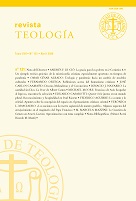Wanting to Live together in a plural World. Recognition and Hospitality at Paul Ricreur
Palavras-chave:
Hospitalidad, Reconocimiento, Traducción, RicoeurResumo
In 2004, Paul Ricreur’s latest publication, On Translation, which includes various texts on the act of translating, understood as a symbol of encounter and recognition beyond differences and diversity, comes to light. The regime of concrete languages, in its multiplicity and dispersion, states that humanity has been configured in finite — and even closed— historical modalities both in geographical space and in historical time. However, translation, in its effective reality, attests that humanity is called to be one. With these basic ideas, Ricreur thinks about the conditions of possibility of the act of translating, in what he calls the “regime of linguistic hospitality”: welcoming another language also implies recognizing the otherness of my own language. How- ever, this regime has a deeper anthropological significance to the extent that it serves as a model to other forms of hospitality, particularly ethical and political ones. Ricreur thus suggests expanding the spirit of translation and its practice, in order to under- stand the “will of living together” in a diverse and plural world. Placed in this ethical- political perspective, the translation paradigm allows us to discern that fraternity is not something already given, but a task to be performed through concrete practices, associated with the desire to understand each other and embrace dialogue and delib- eration as a method and approach. These practices do not suppress —by exclusion or by standardization— the otherness of other cultures, but instead assume it in a broad- er and deeper project, which constitutes their horizon of meaning.Downloads
Downloads
Publicado
2020-04-15
Como Citar
Casarotti, E. (2020). Wanting to Live together in a plural World. Recognition and Hospitality at Paul Ricreur. Teología, 57(131), 99–115. Obtido de https://erevistas.uca.edu.ar/index.php/TEO/article/view/3041
Edição
Secção
Artículos
Licença
Direitos de Autor (c) 2020 Teología

Este trabalho encontra-se publicado com a Licença Internacional Creative Commons Atribuição-NãoComercial-CompartilhaIgual 4.0.














 Teología
Teología